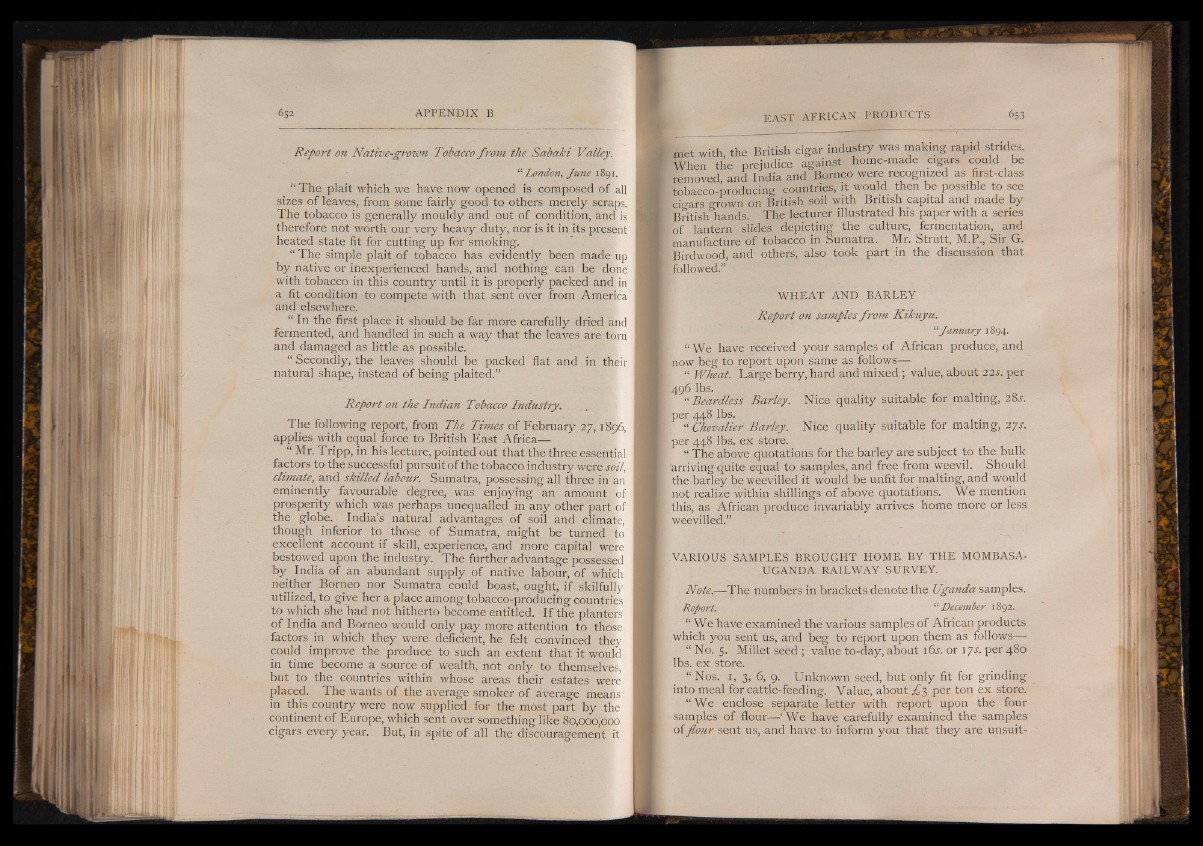
Report on Native-grown Tobacco from the Sabaki Valley.
“ London, June 189-1,
“ The plait which we have now opened is composed of all
sizes of leaves, from some fairly good to others merely scraps.
The tobacco is generally mouldy and out of condition, and is
therefore not worth our very heavy duty, nor is it in its present
heated state fit for cutting up for smoking.
“ The simple plait of tobacco has evidently been made ';up
by native or inexperienced hands, and nothing can be done
with tobacco in this country until it is properly packed and in
a fit condition to compete with that sent over from America
and elsewhere.
“ In the first place it should be far more carefully dried and
fermented, and handled in such a way that the leaves are torn
and damaged as little as possible.
“ Secondly, the leaves should be packed flat and in their
natural shape, instead of being plaited.”
Report on the Indian Tobacco Industry.
The following report, from The Times of February 27,1896,
applies with equal force to British East Africa—
“ Mr. Tripp, in his lecture, pointed out that the three essential
factors to the successful pursuit of the tobacco industry were soil,
climate, and skilled labour. Sumatra, possessing all three in an
eminently favourable degree, was enjoying an amount [of
prosperity which Was perhaps unequalled in any other part bf
the globe. India’s natural advantages of soil and climate,
though inferior to those of Sumatra, might be turned to
excellent account if skill, experience, and more capital were
bestowed upon the industry. The further advantage possessed
by India of an abundant supply of native labour, of which
neither Borneo nor Sumatra could boast, ought, if skilfully
utilized, to give her a place among tobacco-producing countries
to which she had not hitherto become entitled. If the planters
of India and Borneo would only pay more attention to those
factors in which they were deficient, he felt convinced they
could improve the produce to such an extent that it would
in time become a source of wealth, not only to themselves,
but to the countries within whose areas their estates were
placed. The wants of the average smoker of average means
in this country were now supplied for the mdst part by the
continent of Europe, which sent over something like 80,000,000
cigars every year. But, in spite of all the discouragement it
met with the British cigar industry was making rapid strides.
When the prejudice against home-made cigars could be
removed, and India and Borneo were recognized as first-class
tobacco-producing countries, it would then be possible to see
cigars grown on British soil with British capital and made by
British hands. The lecturer illustrated his paper with a series
of lantern slides depicting the culture, fermentation, and
manufacture of tobacco in Sumatra. Mr. Strutt, M.P., Sir G.
Birdwood, and others, also took part in the discussion that
followed.”
WHEAT AND BARLEY
Report on samples from Kikuyu.
“January 1894.
“ We have received your samples of African produce, and
now beg to report upon same as follows—
“ Wheat. Large berry, hard and mixed ; value, about 22s. per
496 lbs.- ' '
“ Beardless Barley. Nice quality suitable for malting, 28j.
per 448 lbs. v -
“ Chevalier Barley. Nice quality suitable for malting, 27s.
per 448 lbs. ex store.
“ The above quotations for the barley are subject to the bulk
’arriving quite equal to samples, and free from weevil. Should
the barley be weevilled it would be unfit for malting, and would
not realize within shillings of above quotations. We mention
this, as African produce invariably arrives home more or less
weevilled.”
VARIOUS SAMPLES BROUGHT HOME BY THE MOMBASA-
UGANDA RAILWAY SURVEY.
Note.— The numbers in brackets denote the Uganda samples.
Report. '■'■December 1892.
“ We have examined the various samples of African products
which you sent us, and beg to report upon them as follows—
“ No. 5- Millet seed ; value to-day, about 16s. or iys. per 480
lbs. ex store.
“ Nos. 1, 3, 6, 9. Unknown seed, but only fit for grinding
into meal for cattle-feeding. Value, about ^3 per ton ex store.
“ We enclose separate letter with report upon the four
samples of flour—■ We have carefully examined the samples
of flour sent us, and have to inform you that they are unsuit